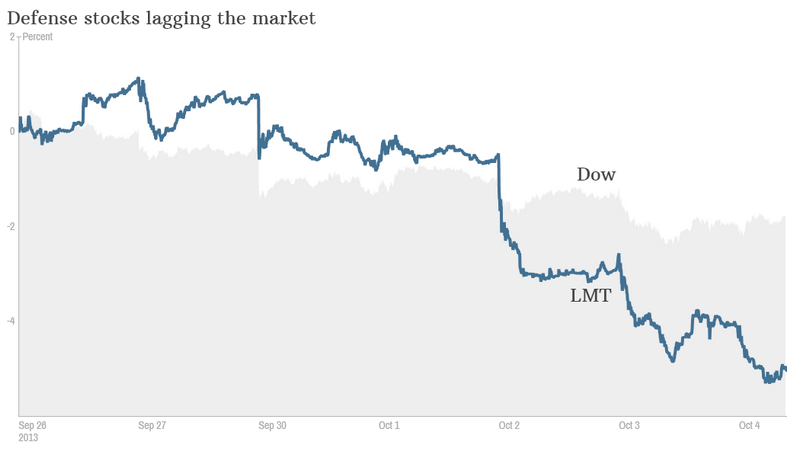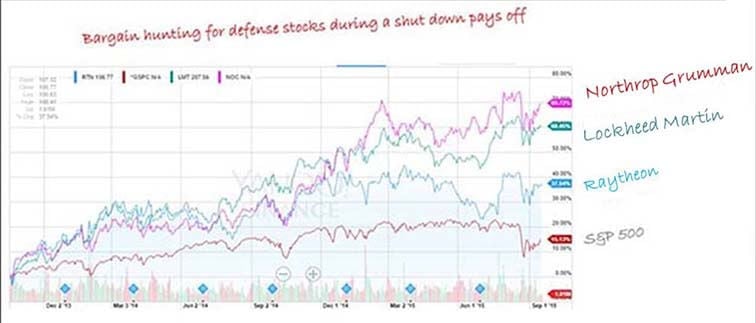 For the second time in two years, Americans face another government shutdown.
For the second time in two years, Americans face another government shutdown.
Oct. 1 marks the first day of fiscal year 2016 - the deadline for funding. But debate over financing nonprofit reproductive healthcare provider Planned Parenthood threatens to halt the nation if no measure is passed to keep the government funded beyond Sept. 30.
Indeed, House Republicans voted on Sept. 18 to block all federal financing for Planned Parenthood - the first step toward a government shutdown this month.
If a government shutdown does happen, we know one thing for sure: defense stocks will get hit - hard.
Consider what happened in late September and early October 2013 as the last shutdown became inevitable...
What a Government Shutdown Really Means for Defense Stocks
"Not surprisingly, mainstream investors were spooked by headlines highlighting the unfolding doom associated with Washington's incompetence in the 2013 government shutdown," Money Morning Chief Investment Strategist Keith Fitz-Gerald told his Total Wealth research service readers on Sept. 18. "Nowhere was that more clearly defined than in defense stocks, with some of the bigger players losing up to 7% of their market capitalization in just three days."
Lockheed Martin Corp.'s (NYSE: LMT) share price dive is a prime example of how defense stocks suffered during the shutdown:

"Raytheon (NYSE: RTN) and Lockheed Martin were in the same boat," Fitz-Gerald noted. "Both fell approximately 6% on the news of the shutdown, shedding tens of billions of dollars in market capitalization as they tumbled."
Northrop Grumman Corp. (NYSE: NOC), United Technologies Corp. (NYSE: UTX), and General Dynamics Corp. (NYSE: GD) are just a few of the others that lost more than the broader markets back then.
But Fitz-Gerald pointed out that what's even more crucial for investors to realize is what happened to these defense stocks just a few short months later.
"Here's the thing - each of those companies came roaring back and investors who swooped in to buy them at a steep discount - as I recommended - have had the opportunity to more than triple the S&P 500 since our government reopened on Oct. 17, 2013," Fitz-Gerald said.
"Now, obviously there are no guarantees. You cannot simply buy any stock that's cheap or in a decline - most are simply junk at a lower price," Fitz-Gerald said. "But companies like the ones we're talking about are high quality players with trillions of dollars driving them and gobs of upside potential ahead. Short-term market movements are nothing more than noise for them."
Fitz-Gerald suggested the best way to play the government shutdown is to take advantage of defense stocks using a "lowball order."
Lowball orders are a wonderful tool for three reasons:
- You can place them in advance.
- You don't have to be at your computer to actively manage your money.
- You control your risk by waiting to make your move until the stock you want to buy meets YOUR risk reward criteria.
Fitz-Gerald also gave away three defense stock picks prime for lowball orders during an upcoming government shutdown to get investors started - you can access them for free here...
Tweet the author @TaraKateClarke, or leave a comment on Money Morning's Facebook page.
The Biggest Threat to Your Money Right Now: The desperate EU refugee crisis is a humanitarian emergency, a logistical nightmare, a political hot potato, and a security risk. But what isn't being addressed by major media outlets - yet, at least - is the refugee crisis' effect on global markets... And investors need to prepare for what's coming. Here's how the EU refugee crisis will impact the global economy - and what investors can do now to get ahead of the chaos...
[mmpazkzone name="end-story-hostage" network="9794" site="307044" id="138536" type="4"]



